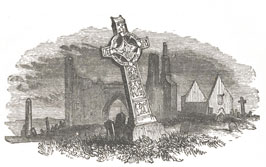Annals of Tigernach

Clonmacnois
Tighernach and his Annals—Erudition and Research of our Early Writers—The Chronicum Scotorum—Duald Mac Firbis—Murdered, and his Murderer is protected by the Penal Laws—The Annals of the Four Masters—Michael O'Clery—His Devotion to his Country—Ward—Colgan—Dedication of the Annals—The Book of Invasions—Proofs of our Early Colonization.

UR illustration can give but a faint idea of the magnificence and extent of the ancient abbey of Clonmacnois, the home of our famous annalist, Tighernach. It has been well observed, that no more ancient chronicler can be produced by the northern nations. Nestor, the father of Russian history, died in 1113; Snorro, the father of Icelandic history, did not appear until a century later; Kadlubeck, the first historian of Poland, died in 1223; and Stierman could not discover a scrap of writing in all Sweden older than 1159, Indeed, he may be compared favourably even with the British historians, who can by no means boast of such ancient pedigrees as the genealogists of Erinn.[6] Tighernach was of the Murray-race of Connacht; of his personal history little is known. His death is noted in the Chronicum Scotorum, where he is styled successor (comharba) of St. Ciaran and St. Coman. The Annals of Innisfallen state that he was interred at Clonmacnois. Perhaps his body was borne to its burial through the very doorway which still remains, of which we gave an illustration at the end of the last chapter.
Notes
[6] Erinn.—O'Curry, page 57. It has also been remarked, that there is no nation in possession of such ancient chronicles written in what is still the language of its people.
